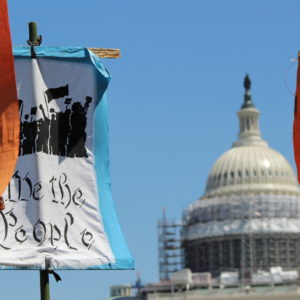As we near the midterm elections in the U.S., I find myself thinking about the campaigners around the world who have helped end oppressive regimes. Like my good friend Bode Oluwafemi who got his start challenging Shell and the brutal Nigerian authoritarian regime. And Lidy Nacpil, a close climate ally who explained the greatest lesson she learned when she organized under the Philippines dictatorship: “We just refused to be defeated. I can’t say we refused to be afraid; courage is not a lack of fear—courage is just continuing to act even if there’s fear.”
As I have had conversations with many of you over these difficult months, I have been struck by how so many of us are refusing to be defeated. How so many are putting ourselves on the line for what we believe in. How so many of us are declaring, “This is not the society I want to live in—and this is what I’m doing about it.” We are each facing our fears and taking action. We are making phone calls, showing up in the streets, knocking on doors, organizing our neighbors and families, and giving resources to challenge the very power structures that have paved the way for the current political situation.
Clear eyes and open hearts
I know it takes courage to face the state of the world with clear eyes and open hearts. As my friend and mentor Kelle Louaillier reminds me from her new role of president emeritus, we must not let fear and despair lead us to settle for Band-Aid solutions to deep-rooted problems. I am inspired by how so many of you are summoning the courage to peel back the layers and expose the depth of the systemic failures we face.
At the root of our broken political system is out-of control corporate power. Transnational corporations and corporate interests have been dismantling democracy brick by brick for decades. Just one example: The American Legislative Exchange Council (ALEC), which has boasted members like Philip Morris International and ExxonMobil, helped pass state “voter ID” legislation that disenfranchises voters, especially Black people and other people of color.
With the Trump administration has come a rapid and full-scale corporate takeover of the federal government. The administration is shredding decades of protections for people and the planet, actively violating human rights, and enacting dangerous foreign policy—all so corporations can profit with impunity.
But here’s the thing: If unchecked corporate power has gotten us here, then corporate campaigning is the best chance we have to get us beyond it.
And if we know how to do anything at Corporate Accountability, it’s comprehensive corporate campaigning. This is a global approach to systemic change that leverages grassroots organizing to apply strategic, direct pressure on corporations, while simultaneously advancing policy measures to rein in their power and curb their abuses.
For more than 40 years, in partnership with members like you and allies around the world like Bode and Lidy, we have been waging corporate campaigns to ensure corporations answer to people, not the other way around. For example, corporate interests have spent decades advancing the false notion that the private sector is better suited than government to deliver public services. As a result, when cities and towns face a water crisis, public officials often see “public-private partnerships”—in other words, water privatization—as the only efficient and effective solution. Our corporate campaigning, waged in collaboration with allied organizations, has broken through this false narrative. Together, we’ve opened up multiple possibilities for cities to keep water systems under democratic control while providing clean water for everyone at rates they can afford. People in cities across the U.S. — from Flint, Michigan to Pittsburgh, Pennsylvania—are demanding exactly that. Together, we have the strategies and power to ensure the human right to water is a reality for everyone.
Yes, and
Recently, we asked a prominent donor-activist and long time Corporate Accountability member her thoughts on the most important thing people should be doing for social change in this political moment.
“All of it,” she said. “We should be doing all of it.”
Yes. When the lives, rights, and dignity of Black people, immigrants, people of color, women, LGBTQ folks, and cash poor people are threatened every day, we must be doing it all. When democracy is on the line, we must do our part to elect and support courageous leaders in government. Indeed, we must create a government that actually reflects the people who make up this country. That means representation by those who have been excluded from public official for far too long.
And at the same time, we must also fundamentally shift the power structures that have given corporations free rein over government policy. We must imagine and build a democracy that is truly responsive to the needs of people, not corporations: Open, participatory elections free from corporate money. Corporations paying their taxes instead of starving the government of the resources it needs to provide essential services. Climate policy freed from the junk science and lobbying of Big Polluters. Elections are one critical step in this longer campaign. Ultimately we can and must lead our leaders in
fundamentally changing the system to achieve true justice.
I know without a doubt we can create that kind of democracy. It’s not going to happen overnight. But if we continue to act from a place of courage, hold on to our vision, and deepen our partnerships, we will get further down the road. And then, further still. Then, probably when we are least expecting it, we will reach a tipping point—followed by a cascade of transformation.
I am enormously grateful to partner with you in this global movement for corporate accountability.







